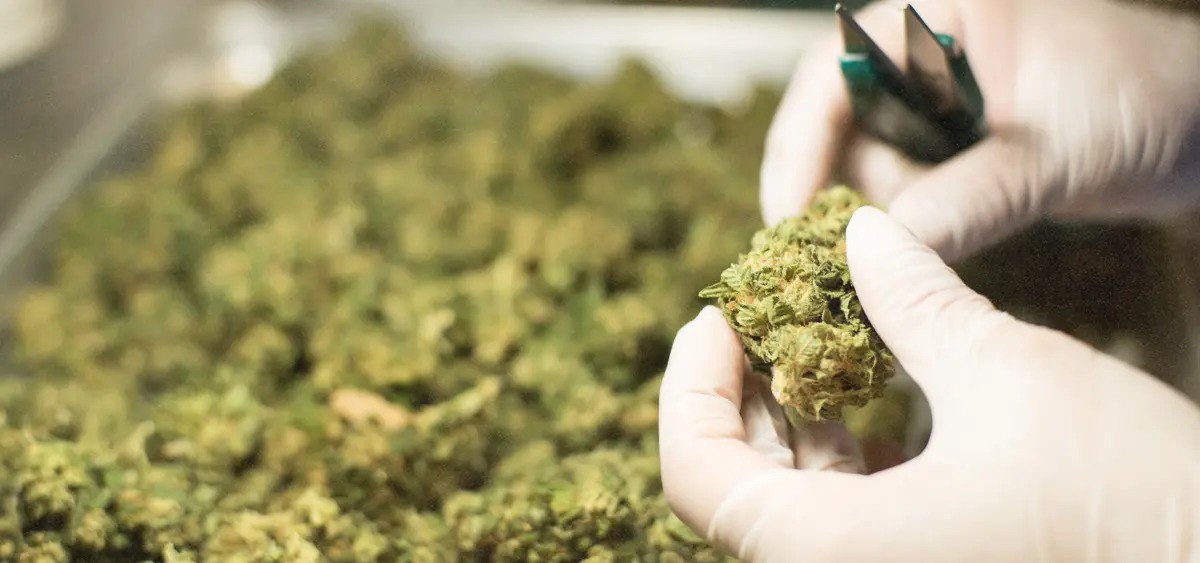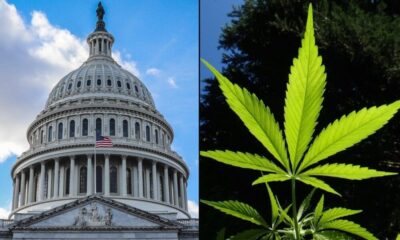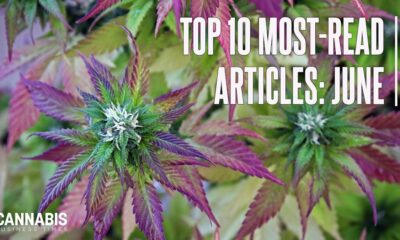featured
Tilray Brands Subsidiary is First Company in Italy Approved to Distribute Medical Cannabis Flower
Published
10 hours agoon

FL Group, a wholly owned subsidiary of Tilray Brands Inc., has become the first company in Italy to receive government approval to distribute medical cannabis flower. The products are set to be available this month in pharmacies throughout the country.
In a statement, Denise Faltischek, chief strategy officer and head of International at Tilray Brands, said the “milestone underscores the vital role of medical cannabis as a therapeutic medicine for patients in need, supporting their health and well-being.”
“We are proud to expand our medical cannabis portfolio in Italy with the introduction of our Tilray Medical high-quality, EU-GMP certified medical cannabis products that uphold the highest standards in patient care,” Faltischek said. “We extend our gratitude to the Ministero della Salute (Italian Ministry of Health) for their trust in Tilray Medical and for providing the necessary regulatory framework to ensure access to safe, consistent and reliable cannabinoid-based therapies. Together, we are advancing health care and patient wellness through innovation and collaboration.” — Faltischek in a press release
The three approved products include Tilray Medical’s Tilray THC 25%, Tilray THC 18%, and Tilray THC 9%/CBD 9%.
Italy legalized medical cannabis in 2013 and initially relied on imported medical cannabis products; however, the Italian Army was later tasked with local cultivation at the Military Pharmaceutical Plant in Florence, which was criticized for producing low quality flower.
Get daily cannabis business news updates. Subscribe
Have an additional perspective to share? Send us a message to let us know, and if your comment is chosen by our editors it could be featured here.
Perspective to add? Suggest a revision or submit commentary for review using the form below.
Ganjapreneur is made possible by our partners:

Author: mscannabiz.com
MScannaBIZ for all you Mississippi Cannabis News and Information.
You may like
-


Leicestershire Police reveal inside of large cannabis farm in Burbage
-


New Michigan Bill Would Legalize Psilocybin For People With PTSD
-


Oregon Campaign To Legalize Cannabis Social Lounges Prepares To Submit First Signatures On Way To 2026 Ballot
-


GOP Congressman Behind Hemp THC Ban Says He’s Not Worried About Potential Senate Opposition To The Proposal
-


US House’s Intoxicating Hemp Ban, Texas Gubernatorial Clash Lead CBT’s Most Popular Stories in June
-


Sunrise Smart Start: Nuclear plant, Marijuana in NY
featured
New Michigan Bill Would Legalize Psilocybin For People With PTSD
Published
27 minutes agoon
June 26, 2025
Michigan Democratic lawmakers havw introduced legislation that would exempt adults with PTSD from state laws against the possession, cultivation and use of psilocybin and psilocin, the two primary active components of psychedelic mushrooms.
If approved, HB 4686, from Rep. Mike McFall and six cosponsors, would effectively legalize the personal use and cultivation of the psychedelic substances by people with the diagnosis. The two-page bill would not create a regulated psychedelics system or change the legal status of the drugs more broadly.
McFall held a press conference on Wednesday about the measure, saying it “will help protect those suffering from PTSD so they can use their medicine without fear of the unnecessary legal risks that veterans seeking this treatment currently must navigate.”
“Our understanding of medicine is constantly evolving, and there has been a shift in treating PTSD with psychedelics over the last decade,” he said. “Preliminary research is promising that psilocybin has potentially life-changing effects for extended periods of time after treatment.”
Appearing with McFall was Michael G. Smith Jr., a retired U.S. Army sergeant who said he’d “had more success in the mitigation of my PTSD symptoms with microdosing psilocybin than all the talk therapy offered by the VA Healthcare System,” adding that he’d tried “all their therapies available” at the Department of Veterans Affairs (VA).
“As a veteran with PTSD, I am encouraged by the legislative efforts to decriminalize psilocybin since it has been clinically proven to mitigate and eliminate the symptomatology related to PTSD,” Smith said. “This is important considering the vast field of studies over 25 years that identify that PTSD can lead to coronary vascular diseases, atrial fibrillation and atrial flutter, which means there is an awesome opportunity to prevent veterans from developing life threatening heart conditions with the treatment of psilocyn.”
A press release from McFall notes that VA “has started research on veterans and treating their PTSD with psychedelics, including psilocybin,” and, citing the advocacy group Heroic Hearts Project, says that 80 percent of veterans experienced improvements in PTSD symptoms after a single psilocybin session.
The bill was officially introduced on Wednesday and has been referred to the House Committee on Families and Veterans.
Last year, Michigan lawmakers sent a letter to Congress, the U.S. Department of Defense and Department of Veterans Affairs (VA) urging them to prioritize research and investment in psychedelics and other “non-technology treatment options” to address psychological trauma from military service.
Several cities in Michigan have enacted local psychedelics decriminalization policies.
Separately in Michigan, a second Bigfoot and marijuana news story recently broke in the state during the span of a single month.
Previously, an alleged Bigfoot sighting in Monroe County last month sparked some creativity within the marijuana community when, earlier this month, the dispensary Uniq Cannabis started offering a free pre-roll to anyone who brought in photographic proof of the mythological creature.
More recently, a Sasquatch statue outside the separate retailer Higher Love, located in Menominee, is at the center of controversy. The exhibit became a talking point at the city planning commission’s meeting this month, where certain community members argued that the faux beast could attract the attention of youth—with one resident advising the panel to “think about what mascots they see in our community and how they are impacting children.”
Meanwhile, state officials earlier this year announced that the disbursement of nearly $100 million in marijuana tax revenue to over 300 cities and tribes across the state thanks to the state’s adult-use legalization law. That’s part of the overall $331 million in tax dollars Michigan is distributing across various initiatives.
The tax dollars will support various local infrastructure, education and other needed services, the state Treasury Department said.
Photo courtesy of Wikimedia/Mushroom Observer.

Author: mscannabiz.com
MScannaBIZ for all you Mississippi Cannabis News and Information.
featured
Oregon Campaign To Legalize Cannabis Social Lounges Prepares To Submit First Signatures On Way To 2026 Ballot
Published
1 hour agoon
June 26, 2025
A campaign in Oregon to allow marijuana social lounges has cleared an early checkpoint on its path to the 2026 state ballot, with organizers recently announcing that they’ve collected enough voter signatures to advance the measure to the next stage of the process.
The Oregon Cannabis Cafe Coalition (OCCC)—a Portland-based group that advocates for the legalization of smoking lounges and cafes where consumption of infused edibles is permitted—says its now collected more than 1,400 signatures, which will be submitted to state elections officials.
Organizers need to submit at least 1,000 validated voter signatures in order for state officials to prepare a ballot title and summary for the proposal. At that point, the campaign could move on to the main signature gathering effort: collecting roughly 120,000 voter signatures to qualify the initiative for the November 2026 general election ballot.
“As of right now, I have taken copies of all the signatures, and we are about to turn them into Salem where they will verify if the signatures are valid and meet the minimum requirement of signatures obtained,” Justyce Seith, OCCC’s founder and the chief petitioner for the Oregon Cannabis Social Lounge Act, told Marijuana Moment this week.
“If signatures are approved,” she added, “they will start drafting the title for this initiative and we will begin our journey to collect the required amount of signatures for the next round!”
The campaign’s immediate goal, Seith continued, is to raise funds to help pay for professional petitioners, billboard advertisements, web design and community events.
She’s also reaching out to companies and individuals who might be able to volunteer, host campaign events or help amplify organizers’ efforts.
“I need help now more than ever,” she said, encouraging supporters to visit the campaign’s website and Instagram page or email organizers directly. “If anyone is willing to contribute monetary funds, or even time and resources, that would be fantastic! I really am just one woman trying to make a difference.”
Seith initially filed the initiative petition in April, a little more than a month after submitting a separate, similar proposal that would legalize cannabis cafes. She clarified on Wednesday that the current initiative, referring to the facilities as “social lounges,” is the measure the campaign will attempt to put before voters.
If passed, it would legalize and regulate state-licensed cannabis consumption lounges, offering what the initiative describes as “a safe, legal environment for adults to consume cannabis” in compliance with state law.
“These lounges will operate in a manner that ensures public health and safety, while providing adult-use cannabis consumers with a designated space to enjoy cannabis in social settings, and allowing the sale and consumption of unmedicated food and beverages,” the petition’s purpose section says.
It specifies that cannabis social lounge licenses would be available only to small cannabis business licensees, known in the state as microbusinesses.
Under the proposal, cannabis social lounges could allow adults 21 and older to consume cannabis and sell “unmedicated food and beverages,” but they could not “sell, distribute, or provide cannabis for sale on the premises” of the business.
Consumption of marijuana “must be limited to smoking, vaping, and the consumption of non-edible products,” the proposal says.
Alcohol and tobacco—including nicotine vape products—would be strictly prohibited at the businesses. They would also need to close by 2 a.m.
It’s unclear whether local governments could prohibit the establishments. The petition says they could “regulate the number of cannabis social lounges” and set further restrictions, but it doesn’t address outright bans. Local governments would also be able to inspect the lounges to ensure compliance with state and local law.
Regulators at the Oregon Liquor and Cannabis Commission (OLCC) would oversee the new businesses. The petition outlines a license application process for lounges as well as basic penalties, noting, for example, that violations of any provisions in the act may result in fines and/or license suspension or revocation. It also says unlicensed operation of a lounge could carry civil and criminal penalties.
As for public education, lounges would be required to post “signs or other visual aids…to inform patrons about the risks of cannabis consumption and the lounge’s operating rules,” the proposal says.
OLCC would also work with public health authorities ” to provide educational materials and outreach programs to ensure that Oregon residents understand the purpose and rules governing cannabis consumption lounges.”
The new measure would appear on Oregon’s November 2026 ballot. If approved, it would take effect January 1, 2027.
Separately in Oregon, state officials earlier this month notified a federal appeals court that they are challenging a lower judge’s ruling striking down a voter-approved law that required licensed marijuana businesses to enter into labor peace agreements with workers and mandated that employers remain neutral in discussions around unionization.
Details of the appeal are still unknown, but the court gave the state a deadline of September 3 to provide an opening brief, and the plaintiffs must file a reply brief by October 3.
Under the currently paused law, a marijuana businesses that was unable to provide proof of a labor peace agreement could have been subject a denial or revocation of their license.
Meanwhile, an ongoing federal lawsuit in Oregon could eventually give more people legal access to psilocybin, with plaintiffs arguing that the state’s first-in-the nation psilocybin law wrongfully prevents homebound patients from seeking care.
In an 12-page ruling issued late last month, District Judge Mustafa T. Kasubhai denied the state’s motion to dismiss the suit, opining that the plaintiffs have standing to bring the challenge and that a modification of the state’s psilocybin law to provide a reasonable accommodation to homebound patients under the federal Americans with Disabilities Act (ADA) would not violate principles of federalism.
“The Court agrees with Plaintiffs and finds that their requested remedy rests on physical access rather than use or distribution of a controlled substance in violation of state and federal laws,” the ruling said.
Also last month, the state’s governor signed a bill into law that will allow marijuana businesses to offer samples of their products at trade events, while removing restrictions on wholesale transactions between cannabis companies at those gatherings.

Author: mscannabiz.com
MScannaBIZ for all you Mississippi Cannabis News and Information.
featured
GOP Congressman Behind Hemp THC Ban Says He’s Not Worried About Potential Senate Opposition To The Proposal
Published
2 hours agoon
June 26, 2025
A GOP congressman pushing for a federal hemp THC ban in a spending bill that’s advancing in the House says he’s not concerned about any potential opposition in the Senate—and he’s also disputing reports about the scope of what his legislation would do to the industry.
Rep. Andy Harris (R-MD) told Marijuana Moment on Wednesday that “the bottom line is that you have some bad actors who are taking advantage of a loophole in the Farm Bill to sell psychoactive substances,” which was “not the intention.”
The congressman was referencing a large-scale agriculture bill that President Donald Trump signed into law during his first term that federally legalized hemp and its derivatives.
The 2026 spending legislation that contains provisions to ban consumable hemp products with any quantifiable amount of THC advanced out of the House Appropriations Committee on Monday and is now headed to the floor before potentially getting taken up by the Senate.
Asked whether he worried about pushback on the hemp language in the opposite chamber, Harris said, “I don’t think so.”
“I think we very carefully drafted it,” he said, adding that, “I think there was some misunderstanding about the wording that some people said, somehow, any measurable amount [of THC] would result in it not being able to be sold. That’s not what the legislation said.”
But while a report attached to the legislation was amended to make that clarification, signaling that Congress doesn’t mean to prohibit non-intoxicating consumable cannabinoids like CBD, the text of the bill itself hasn’t been changed.
The relevant section would redefine the crop under federal statute in a way that would still prohibit cannabis products containing any “quantifiable” amount of THC or “any other cannabinoids that have similar effects (or are marketed to have similar effects) on humans or animals” as THC.
Harris—who serves as chair of the House Appropriations Subcommittee on Agriculture, Rural Development, Food and Drug Administration, and Related Agencies—also noted in the interview with Marijuana Moment that there “was no opposition [to the hemp provisions] that came up in committee, that’s for sure.”
He also briefly weighed in on the Texas governor’s recent veto of a bill to recriminalize hemp products with any THC—simply stating that he’s “not paying attention to what a single state is doing” while he focuses on enacting the proposed federal ban.
The language in the congressional bill, meanwhile, would still effectively eliminate the most commonly marketed hemp products within the industry, as even non-intoxicating CBD items that are sold across the country typically contain trace amounts of THC. Under current law, those products are allowed if they contain no more than 0.3 percent THC by dry weight.
The proposed policy championed by Harris would drastically change that. It would instead maintain the legal status of “industrial hemp” under a revised definition that allows for the cultivation and sale of hemp grown for fiber, whole grain, oil, cake, nut, hull, microgreens or “other edible hemp leaf products intended for human consumption.”
The Congressional Research Service (CRS) released a report last week stating that the legislation would “effectively” prohibit hemp-derived cannabinoid products. Initially it said that such a ban would prevent the sale of CBD as well, but the CRS report was updated to exclude that language for reasons that are unclear.
The hemp language is largely consistent with appropriations and agriculture legislation that was introduced, but not ultimately enacted, under the last Congress.
Hemp industry stakeholders rallied against that proposal, an earlier version of which was also included in the base bill from the subcommittee last year. It’s virtually identical to a provision of the 2024 Farm Bill that was attached by a separate committee last May via an amendment from Rep. Mary Miller (R-IL), which was also not enacted into law.
There are some differences between the prior spending bill and this latest version for 2026, including a redefining of what constitutes a “quantifiable” amount of THC that’d be prohibited for hemp products.
It now says that a quantifiable amount is “based on substance, form, manufacture, or article (as determined by the Secretary of Health and Human Services in consultation with the Secretary of Agriculture),” whereas it was previously defined as an amount simply “determined by the Secretary in consultation with the Secretary of Health and Human Services.”
The proposed legislation also now specifies that the term hemp does not include “a drug that is the subject of an application approved under subsection (c) or (j) of section 505 of the Federal Food, Drug, and Cosmetic Act (21 U.S.C. 355),” which seems to carve out an exception for Food and Drug Administration- (FDA) approved drugs such Epidiolex, which is synthesized from CBD.
A leading alcohol industry association, meanwhile, has called on Congress to dial back language in the House spending bill that would ban most consumable hemp products, instead proposing to maintain the legalization of naturally derived cannabinoids from the crop and only prohibit synthetic items.
Wine & Spirits Wholesalers of America (WSWA) President and CEO Francis Creighton said in a press release that “proponents and opponents alike have agreed that this language amounts to a ban.”
“By pushing a rapidly evolving industry back into the shadows, Congress is creating even more chaos in the marketplace, undermining state initiatives and punishing responsible actors,” he said. “We urge the full House to reconsider this approach. States can regulate intoxicating products safely and effectively through systems that preserve consumer trust and public safety. It’s time for Congress to follow their lead, not override their authority.”
Members of WSWA also met with lawmakers and staffers in April to advocate for three key policy priorities that the group says is based on “sound principles of alcohol distribution.” They include banning synthetic THC, setting up a federal system for testing and labeling products and establishing state-level power to regulate retail sales.
Separately, key GOP congressional lawmakers—including one member who supports marijuana legalization—don’t seem especially concerned about provisions in the bill despite concern from stakeholders that it would put much of the hemp industry in jeopardy by banning most consumable products derived from the plant.
—
Marijuana Moment is tracking hundreds of cannabis, psychedelics and drug policy bills in state legislatures and Congress this year. Patreon supporters pledging at least $25/month get access to our interactive maps, charts and hearing calendar so they don’t miss any developments.![]()
Learn more about our marijuana bill tracker and become a supporter on Patreon to get access.
—
Jonathan Miller, general counsel of the U.S. Hemp Roundtable, told congressional lawmakers in April that the market is “begging” for federal regulations around cannabis products.
At the hearing, Rep. James Comer (R-KY) also inquired about FDA inaction around regulations, sarcastically asking if it’d require “a gazillion bureaucrats that work from home” to regulate cannabinoids such as CBD.
A report from Bloomberg Intelligence (BI) last year called cannabis a “significant threat” to the alcohol industry, citing survey data that suggests more people are using cannabis as a substitute for alcoholic beverages such a beer and wine.
Last November, meanwhile, a beer industry trade group put out a statement of guiding principles to address what it called “the proliferation of largely unregulated intoxicating hemp and cannabis products,” warning of risks to consumers and communities resulting from THC consumption.
The LCB contributed reporting from Washington, D.C.

Author: mscannabiz.com
MScannaBIZ for all you Mississippi Cannabis News and Information.

Leicestershire Police reveal inside of large cannabis farm in Burbage

New Michigan Bill Would Legalize Psilocybin For People With PTSD

Oregon Campaign To Legalize Cannabis Social Lounges Prepares To Submit First Signatures On Way To 2026 Ballot

GOP Congressman Behind Hemp THC Ban Says He’s Not Worried About Potential Senate Opposition To The Proposal

US House’s Intoxicating Hemp Ban, Texas Gubernatorial Clash Lead CBT’s Most Popular Stories in June

Sunrise Smart Start: Nuclear plant, Marijuana in NY

What’s the proper way to transport medical marijuana in Florida?

FDA Plan To Include Hemp-Derived Cannabinoids In Federal Adverse Health Event Reporting System Goes To White House For Approval

Two In Three Wisconsin Voters Back Marijuana Legalization, New Poll Shows As Governor Predicts Reform In Next Session Under Democratic Control

Congress votes to let VA docs recommend medical cannabis for veterans (Newsletter: June 26, 2025)

Tilray Brands Subsidiary is First Company in Italy Approved to Distribute Medical Cannabis Flower

Michigan Cannabis Sales Fall, But Consumers Are Buying More at Dispensaries

Montana Gov. Vetoes Bill on Tribal Cannabis Agreements

Investigators: Crew broke into 4 dispensaries around Michigan

Thailand banning cannabis sales without a prescription 3 years after decriminalization

Marijuana Industry Workers Are The Happiest In Any Job Sector In The U.S., Survey Finds

Ohio Lawmakers Cancel Another Hearing On Bill To Alter Voter-Approved Marijuana Legalization Law Amid GOP Disagreements

Ohio Lawmakers Cancel Another Hearing On Bill To Alter Voter-Approved Marijuana Legalization Law Amid GOP Disagreements

Federal Court Upholds Arkansas Hemp Restrictions, Contradicting Texas Governor’s Stance In Vetoing Proposed Ban In His State

NORML Op-Ed: Debunking Cannabis Potency Myths

Report 15% of NY Adults Use Cannabis
Rand Paul Files Bill To Triple Federal THC Limit For Hemp As House Pursues Crackdown On Consumable Cannabinoids

Marketshare of cannabis sleep aids skyrockets

US House Committee Approves Bill to Close THCA ‘Loophole,’ Ban Intoxicating Hemp Products

Alert: Department of Cannabis Control updates data dashboards with full data for 2023

Connecticut Appoints The US’s First Cannabis Ombudsperson – Yes there is a pun in there and I’m Sure Erin Kirk Is Going To Hear It More Than Once!

5 best CBD creams of 2024 by Leafly

Free delta-9 gummies from Bay Smokes
New Study Analyzes the Effects of THCV, CBD on Weight Loss

EU initiative begins bid to open access to psychedelic therapies

Mississippi city official pleads guilty to selling fake CBD products

Curaleaf Start Process Of Getting Their Claws Into The UK’s National Health System – With Former MP (Resigned Today 30/5/24) As The Front Man

May 2024 Leafly HighLight: Pink Runtz strain

5 best autoflower seed banks of 2024 by Leafly

Horn Lake denies cannabis dispensary request to allow sale of drug paraphernalia and Sunday sales | News

Discover New York’s dankest cannabis brands [September 2024]

Press Release: CANNRA Calls for Farm Bill to Clarify Existing State Authority to Regulate Hemp Products

Nevada CCB to Accept Applications for Cannabis Establishments in White Pine County – “Only one cultivation and one production license will be awarded in White Pine County”

Local medical cannabis dispensary reacts to MSDH pulling Rapid Analytics License – WLBT

6 best CBD gummies of 2024 by Leafly

5 best THC drinks of 2024 by Leafly

The Daily Hit: October 2, 2024

5 best delta-9 THC gummies of 2024 by Leafly

Weekly Update: Monday, May 13, 2024 including, New Guide for Renewals & May Board meeting application deadline

People In This State Googled ‘Medical Marijuana’ The Most, Study Shows

Thailand: Pro-cannabis advocates rally ahead of the government’s plan to recriminalize the plant

PRESS RELEASE : Justice Department Submits Proposed Regulation to Reschedule Marijuana

Press Release: May 9, STIIIZY and Healing Urban Barrios hosted an Expungement Clinic & Second Chance Resource Fair
Trending
-

 California Cannabis Updates1 year ago
California Cannabis Updates1 year agoAlert: Department of Cannabis Control updates data dashboards with full data for 2023
-

 Breaking News1 year ago
Breaking News1 year agoConnecticut Appoints The US’s First Cannabis Ombudsperson – Yes there is a pun in there and I’m Sure Erin Kirk Is Going To Hear It More Than Once!
-

 best list11 months ago
best list11 months ago5 best CBD creams of 2024 by Leafly
-

 Bay Smokes12 months ago
Bay Smokes12 months agoFree delta-9 gummies from Bay Smokes
-

 cbd1 year ago
cbd1 year agoNew Study Analyzes the Effects of THCV, CBD on Weight Loss
-

 Business9 months ago
Business9 months agoEU initiative begins bid to open access to psychedelic therapies
-

 Mississippi Cannabis News1 year ago
Mississippi Cannabis News1 year agoMississippi city official pleads guilty to selling fake CBD products
-

 Breaking News1 year ago
Breaking News1 year agoCuraleaf Start Process Of Getting Their Claws Into The UK’s National Health System – With Former MP (Resigned Today 30/5/24) As The Front Man

